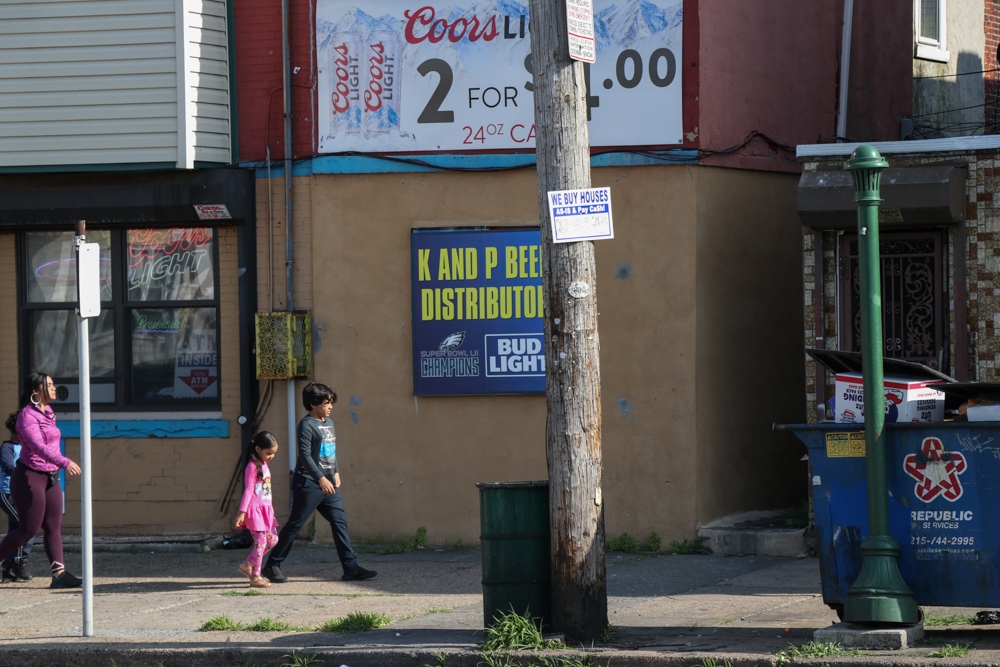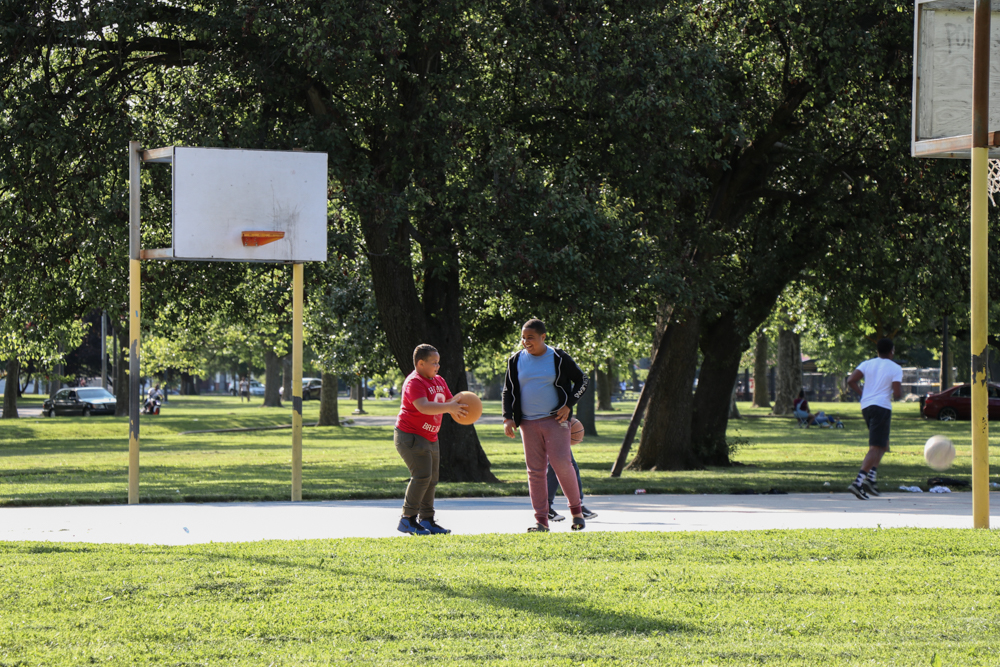
Jassy Perez, a mother and resident of Hunting Park, doesn’t usually vote, but said she is unhappy with the amount of crime in her neighborhood.
“There’s violence, shootings, and people selling drugs on the corners out here and selling it to kids,” Perez said. “None of it is being addressed. And right over there on Darien Street, there’s always shootings over there. Every other week someone is dead in that area.”
Perez said she is concerned for her children and their safety growing up in North Philadelphia.
“We need to fix these problems to protect our youth,” she said.
That need is something recognized by Patrick Christmas, the policy director at Committee Seventy, a non-profit organization focused on civic engagement.

Patrick Christmas, the policy director at the Committee of Seventy, sits at his desk on June 3, 2019 in Philadelphia, Pa.
“There are numerous challenges Philadelphians face,” Christmas said. “We’re low wealth. We’re low income. We have public safety issues. We have crime and drugs, and our school system is not what it should be.”
One key to facing challenges, Christmas said, is increasing voter participation. People who show up tend to be the ones who get their issues addressed.
This year’s primary races for local elections saw one of the highest voter turnouts in recent Philadelphia history, but large gaps in participation persist within certain neighborhoods. In Chestnut Hill and Mt. Airy, there is a regular stream of voters who always turn up, but in neighborhoods such as Hunting Park and Franklinville, that isn’t the case.
Professionals from all over the city, from party ward leaders to civic engagement organizations, believe there are multiple reasons for this disparity.
Christmas looks for ways to address this disparity by making voting more accessible for all Philadelphians.
According the Pew Charitable Trust’s 2018 State of the City report, Hunting Park, located in the 7th Ward, saw the lowest voter participation in the city, 16 percent, for the 2018 congressional midterm elections.
According to Christmas, in the 7th Ward, where challenges like crime, safety, and drug addiction are prevalent, it can make it difficult for residents to connect their personal act of voting to the change they want to see.
Angel Cruz, the 7th Ward Leader, said the only time his ward has seen a large turnout was the 2016 presidential election. Since then, participation has decreased over time.
“Now surprisingly, with this being a mayor’s election, for some reason the turnout was really low,” Cruz said.
However, Cruz believes low voter turnout and high crime in Hunting Park are directly linked to the lack of educational opportunity.
“I think if they really want to increase voter participation, they need to fund education in schools so that the kids learn what a state representative is, who a city council member is, and what their responsibilities are to become an upstanding citizen,” Cruz said.
Ronald Robinson, a resident of Hunting Park, said he continues to vote in the hopes that the city will address crime in his neighborhood, because it keeps him from leaving his house to do much of anything.
“Lately this neighborhood scares me,” he said. “I usually stay in my house at night cus’ there’s too much killing, just too much.”
Robinson said he has lived in Hunting Park for many years but has not seen the changes he had hoped for.
“It’s been a long time since anyone’s come in this neighborhood to do some good,” Robinson said. “There’s been three murders up here within a week’s span.”
In the northwest corner of the city, it is a different story. Chestnut Hill, in the 9th Ward, is just a few miles from Hunting Park and is known for its relatively safe streets and concentration of wealth. Chestnut Hill also had the highest voter turnout in Philadelphia with a 47 percent participation rate in 2018.

State Sen. Chris Rabb is the 9th Ward Leader. He and his staff have made major efforts in increasing turnout within the ward.
“We had an event early in this election cycle that did a few things,” Rabb said. “All candidates were invited out here to meet committee people so that we could decide who to endorse.”
Rabb and his staff have started using social media as a tool to reach voters. They conducted interviews via Facebook with 38 candidates running for judgeships, city council, and city commissioner. These interviews featured one minute clips of each candidate stating what they’re running for.
“One last piece of what we do is something we’ve done for decades in our ward,” Rabb said. “We write letters for each of our 17 divisions, why it’s important to vote, give basic information to our voters, and why our ward supports a candidate. Our residents expect these letters.”
Rabb also relies on direct engagement with residents to know what concerns they want city and state politicians to address.
“We want to know how do we get people involved so they can make a difference,” he said.
Residents in this part of the city tend not to have to worry about crime in the same way as residents in Hunting Park, but they still have issues they want to put before elected officials. Frank Steo, a resident of Chestnut Hill, is concerned about infrastructure within his ward.
“The cobblestones here are horrible,” Steo said. “It’s really hard for me to walk on them, you know? It’s painful. But I mean, how much money would it cost to fix that?”

Frank Steo, a resident of Chestnut Hill, stands in front of the Starbucks he gets his morning coffee from every day.
Steo said even the employees at the Starbucks on Germantown Avenue know not to fill the coffee to the top for people who drive over the cobblestones.
“It’s trivial stuff, but nonetheless, it should be fixed,” Steo said.
Christmas said wealth and educational opportunity are directly correlated to voter participation. If a neighborhood has higher income and higher rates of education, it is likely going to have a higher turnout. Politicians pay attention to those who show up, Christmas said.
“When turnout is low, it’s particularly beneficial to those that are already in power,” Christmas said. “Those in power already have the relationships and the infrastructure to turn out their folks. Generally, low turnout elections in Philly, means that we’re not going to have any kind of change.”
Rabb said there is an appetite for new blood in Philadelphia politics. Residents in his ward want to shake things up by supporting new people who can give a fresh perspective on government, and, according to Rabb, there is a feeling of change in the air.

Committee of Seventy, an organization that works to drive up civic engagement, was founded in 1904.
“There are tons of people doing really incredible work in their neighborhoods across the city and I think if there’s anything, we can and should do a better job supporting them,” Christmas said.
As disparities persist, those who show up will consistently have their agenda represented in the halls of power, Christmas said. One way to change the agenda is to help more people show up on election day.
“That means going out to their neighborhood and either helping them organize an event or helping provide the resources they need,” he said.
Please email any questions or concerns about this story to: [email protected].







Be the first to comment